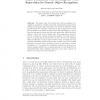Free Online Productivity Tools
i2Speak
i2Symbol
i2OCR
iTex2Img
iWeb2Print
iWeb2Shot
i2Type
iPdf2Split
iPdf2Merge
i2Bopomofo
i2Arabic
i2Style
i2Image
i2PDF
iLatex2Rtf
Sci2ools
114
Voted
SCIA
2005
Springer
2005
Springer
Object Localization with Boosting and Weak Supervision for Generic Object Recognition
Abstract. This paper deals, for the first time, with an analysis of localization capabilities of weakly supervised categorization systems. Most existing categorization approaches have been tested on databases, which (a) either show the object(s) of interest in a very prominent way so that their localization can hardly be judged from these experiments, or (b) at least the learning procedure was done with supervision, which forces the system to learn only object relevant data. These approaches cannot be directly compared to a nearly unsupervised method. The main contribution of our paper thus is twofold: First, we have set up a new database which is sufficiently complex, balanced with respect to background, and includes localization ground truth. Second, we show, how our successful approach for generic object recognition [14] can be extended to perform localization, too. To analyze its localization potential, we develop localization measures which focus on approaches based on Boosting [...
Related Content
| Added | 28 Jun 2010 |
| Updated | 28 Jun 2010 |
| Type | Conference |
| Year | 2005 |
| Where | SCIA |
| Authors | Andreas Opelt, Axel Pinz |
Comments (0)

